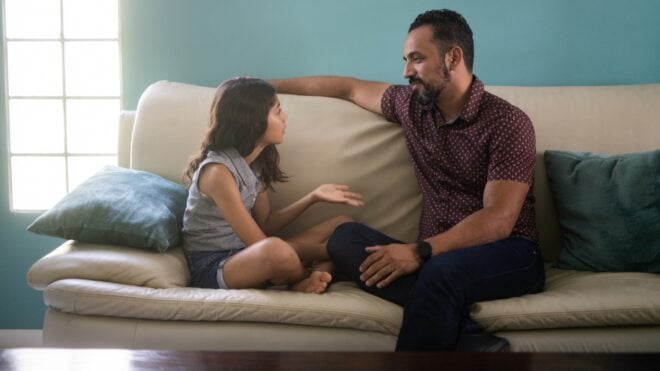Facebook just eliminated the word “fat” from its dropdown menu of feelings people can include in their status updates. This change was made in response to an online petition from Endangered Bodies, a group whose mission is to counter negative body image. Endangered Bodies used the tagline #FatIsNotaFeeling to urge Facebook to remove the “I feel fat” option from its list of over 100 emotions, which include “pissed off,” “heartbroken” and “relaxed.”
Though I support this change, I had a visceral reaction to the tagline #FatIsNotaFeeling. Because for me, it was.
RELATED: My Toddler Called a Stranger Fat
Starting in early middle school, I felt fat. The feeling struck in the middle of the night, after I’d snuck downstairs to steal a large handful of Doritos and a chunk of cheese, swaddling them in a quarter-folded paper towel. After demolishing them in the safety of my bed, stuffed and ashamed, I imagined the globules of fat in the flesh of my face, the soft slope just beneath my chin, before it traveled like a virus through my body, settling in my thighs and butt. This was what fat felt like: greasy, lonely, completely out of control of my own appetites.
I felt fat when I pulled on jeans that sucked too closely to my skin, that left red, angry welts around my waist or that puckered around my hips. I felt fat when the cute boy in science class didn’t notice me. I felt fat walking down the street, yanking a thick sweater, even in summer, in an attempt to camouflage my hips. I felt fat when over and over again, I planned strict methods of eating and exercising, and over and over again, I fell off the wagon. I felt fat when I was chubby and I felt fat when I was stick thin.
Feeling fat … was a symptom, a shorthand, for feeling unworthy, ashamed, not good enough or scared.
Fat was a feeling, and it was the feeling I built too much of my early life around. With a lot of therapy, yoga and support groups, and the process watching my body carry, birth and feed two children, I am mostly free of this feeling today.
Though I’m grateful that my struggles with my body have mostly been resolved, I wonder what I could’ve done if I’d been able to siphon all the physical and mental energy I spent worrying about what I was eating and how I looked, and put it into something productive or peaceful.
In retrospect, feeling fat was a disconnect from feeling what was really going on. It was a symptom, a shorthand, for feeling unworthy, ashamed, not good enough or scared. It was connected to feeling as if there was simply too much of me—too much flesh, too much appetite, both literally and figuratively.
While I remember distinctly the feeling of fat, we don’t need to include it in a dropdown menu for young or susceptible people to choose from. Endangered Bodies helped Facebook do a small, important thing, by eliminating a feeling that is really a symptom rather than a human emotion.
RELATED: 3 Ways We’re Bringing Mindfulness Into Our Home
To help counter our culture’s obsession with bodies, I model healthy eating and exercising. I refrain from making negative comments about anyone’s body, including my own. We also don’t own a scale. If we all do enough small, important things, maybe our kids won’t even know what it means to “feel fat.”
With a young daughter and son, I spend a lot of time hoping that they won’t struggle with the same pervasive body image issues I did. I know that our culture will negatively influence how they think about bodies, but I pray that they’ll be empowered enough to use their energy in more positive ways than battling their own flesh.
Image via change.org




